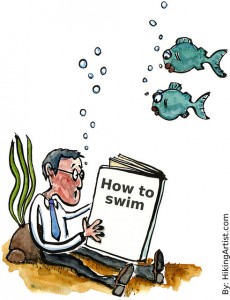In the late 90’s, I finally got my first cellphone. I fought it for years.
The idea that I would be on the phone during my quiet time or drive time talking (and probably working) did not appeal to me in the least. Sure there were social benefits, but I wanted time to recharge, unplug, meditate, and collect my thoughts. In short, I wanted down time. Fast forward to 2014.
Now, it would be almost impossible to live without this device. Why is that? (Long live down time, rest in peace.)
Ask yourself: have you ever gone a day without your smartphone or mobile device? If you unplugged from the net and social media, how long would you last–two days perhaps, a week?
Let’s make this a multiple choice question.
With no mobile device, would you feel:
A. Isolated
B. Uninformed
C. Vulnerable
D. All of the above
For many, the answer is D.
In the end, I needed a cellphone because I couldn’t wait to know things any more. I needed to reach people wherever I was, at times to keep in touch for social reasons, but more often to get things done or grab a quick update from someone to assess and learn what needed to be done next.
As I write this blog, I’m finding it interesting that there are some keywords I just can’t avoid. This is not for SEO purposes (sorry Google), but rather because I can only describe what I’m saying by using these words and they keep popping up. Do you see a pattern yet?
The fact is, I can’t talk about connecting with other people without using the words “know” and “learn.” (Well whaddaya know?) If you think about it (“think”–there’s another one), it’s engrained in our social language.
In fact, I hate to admit it, but it’s no longer just me on the continuous learning bandwagon. How many times have you seen the word “webinar” in your email box lately? There sure seem to be a lot of free classes these days. And how many seminars have you gone to this year? It seems like a lot of expense to put those on, doesn’t it?
I went to a couple of free business strategy meetings and M&A seminars earlier this year, and I learned a lot. I’m not being facitious, I really did. It was a valuable experience, and I couldn’t help being struck by how much they had to educate me in order for me to become their future customer. And that’s when it hit me:
We are all in the education business now. Every one of us.
Whether you’re educating your future customers, current customers, peers, co-workers, employees, investors, the press, the general public, or friends and family; if you want to stay relevant, people need to understand what you’re doing, how it works, and why it’s important. Things are moving too fast for people to pay attention to anything if they don’t understand its value.
I also equate this idea with the reason we received so many questions recently at Lrngo from users wanting to know how to promote their expertise and themselves as speakers; which became the subject of two Lrngo blogs earlier this year. So many people with expertise wanted to gain speaking experience and promote themselves by giving presentations, webinars and classes on their topics, that we had to dig in and come up with the information.
This trend isn’t as much about 15 minutes of fame as it is about survival of the fittest. The consultant, service provider or company that doesn’t stay ahead of the curve by educating their target market on why they are needed and what makes them different won’t be around very long.
As we shift to the reputation economy and social media shines the spotlight on the expertise of individuals, the move toward constantly educating and re-educating each other is not likely to subside any time soon. In the words of Denis Waitley, “<you can> never become so much of an expert that you stop gaining expertise.” You have to stay ahead of the curve.
In late 2014, I finally joined Twitter. I fought it for years. It’s amazing how much you can learn from one sentence.
Follow me on Twitter @davidcbrake

 In our last blog, we touched on the
In our last blog, we touched on the 